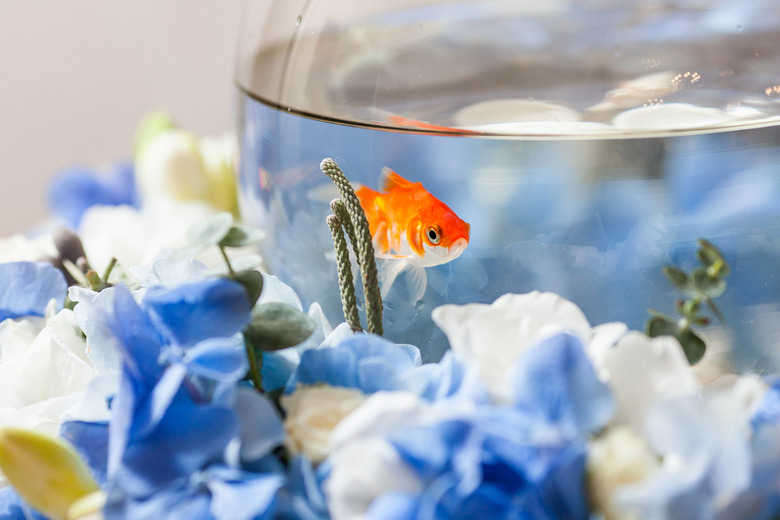Ideas For Science Fair Projects On Fish
Participating in science fair projects is a good way to learn the process of scientific inquiry. By doing such projects, children acquire the skills of discipline, observation and documentation that are critical to experimentation. Science projects on fish are interesting and easy to do. When choosing a project idea, however, it is important you focus on finding a topic that is age-appropriate.
Fish and Light
Fish and Light
Fish activity is affected by light. You can design a project to study the influence of different types of light on fish behavior. Buy some small fish tanks and fit each tank with a different set of lights, such as LED aquarium bulbs, regular bulbs and compact fluorescent bulbs. Remove each tank's overhead light hood and screw in the appropriate light bulb. Place the light hood back into position on top of the tank and secure it firmly in place. Have students add around eight to 10 small fish of the same species into each fish tank. Keep all other factors such as amount of feed, water quality and water temperature constant. Get students to maintain records of how active the fish are in each tank and how they respond to movements near the tank. Use these observations to explain the concept that fish require light to carry out activities. Bright light improves visibility, making the fish more alert and active. Help students understand that this property is responsible for the greater activity they observe in the tank fitted with fluorescent lamps.
Fish and a Mirror
Fish and a Mirror
It is well known that male cichlids, a type of freshwater fish, are hostile in response to other fish. You can base a science project on this observation by placing a mirror along one side of the fish tank. Place a single male cichlid in a freshwater fish tank and attach a mirror to one surface. Ask children to observe as the fish lunges toward its own reflection whenever it turns to face the mirrored surface. Describe the concept of territorial behavior as the instinct of the fish to retain its right to occupy a particular territory alone, without allowing any other fish inside. Explain that the mirror provides the fish its own reflection, but since it does not know to recognize this, it assumes there is another fish inside the tank and reacts with hostility.
Fish and their Territory
Fish and their Territory
Male betta fish are known for their territorial nature. Use this characteristic to demonstrate how they respond to infiltrators. Purchase two fish bowls and two male betta fish and have students place each fish in its own bowl alone for about three weeks. Then take one fish out of its bowl and introduce it into the bowl containing the other fish. Ask students to observe the immediate aggressive action as the fish lunge at each other. Be prepared to remove the first fish immediately, because Betta fish will fight to the finish. Explain how male Betta fish are extremely territorial in nature, and will not tolerate any other fish in their area because of the competition it will create for space and mating.
Fish Respiration and Temperature
Fish Respiration and Temperature
Certain fish show a change in color as well as rate of respiration at higher temperatures. Carry out an experiment that determines if this is true with all species of fish. Purchase different fish varieties and get information about the temperature that is ideal for them and what temperature to avoid. Have students place these fish in a water tank and make a note of each one's color. Show children how to count the number of breaths a fish takes in one minute. Teach students to recognize when the fish breathes by watching it flutter its gills while closing its mouth. After a week, increase the temperature of the water in the tank by five degrees using an aquarium heater. Again observe the fish for change in color and measure the respiration rate. Repeat with another five degree raise in temperature after another week to get even more clear results. However, take care that you don't exceed the temperature limit specified. Using the breathing measurements collected during the experiment help children understand that fish respiration rate is higher in water at a higher temperature. Explain how the metabolic activity of fish increases in warm water and therefore, this means a greater need for oxygen, which stimulates faster breathing.
Cite This Article
MLA
Stewart, David. "Ideas For Science Fair Projects On Fish" sciencing.com, https://www.sciencing.com/ideas-science-fair-projects-fish-8015785/. 13 March 2018.
APA
Stewart, David. (2018, March 13). Ideas For Science Fair Projects On Fish. sciencing.com. Retrieved from https://www.sciencing.com/ideas-science-fair-projects-fish-8015785/
Chicago
Stewart, David. Ideas For Science Fair Projects On Fish last modified August 30, 2022. https://www.sciencing.com/ideas-science-fair-projects-fish-8015785/
